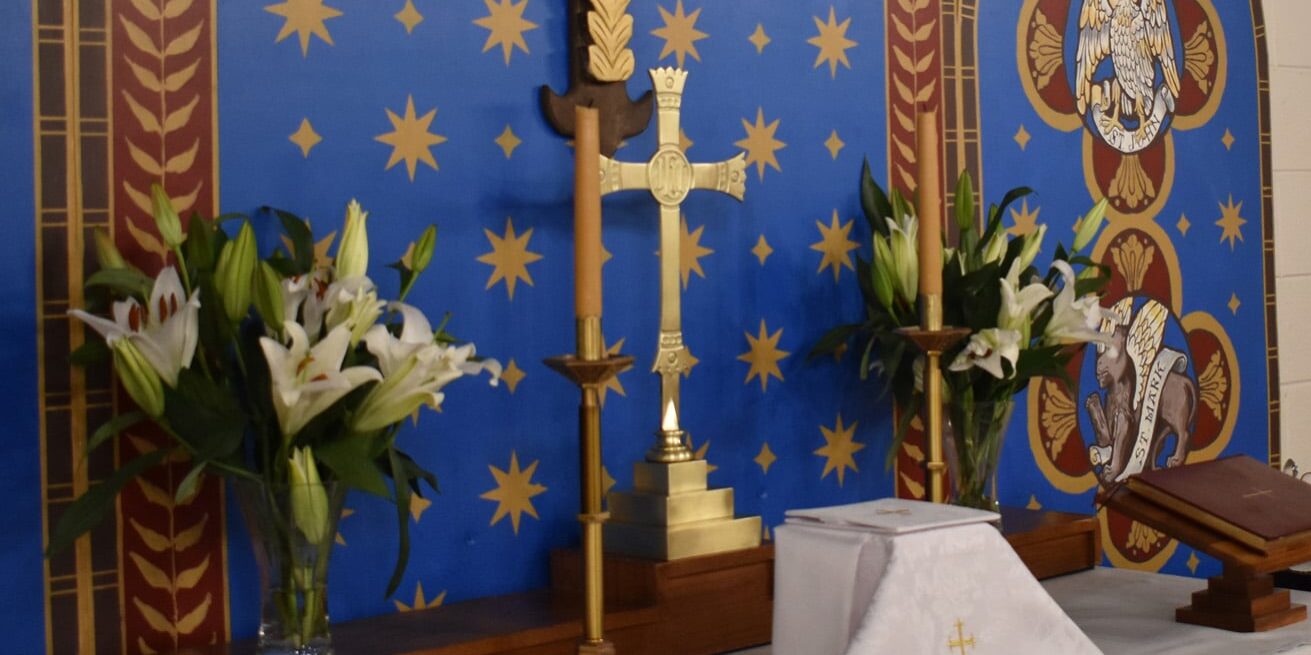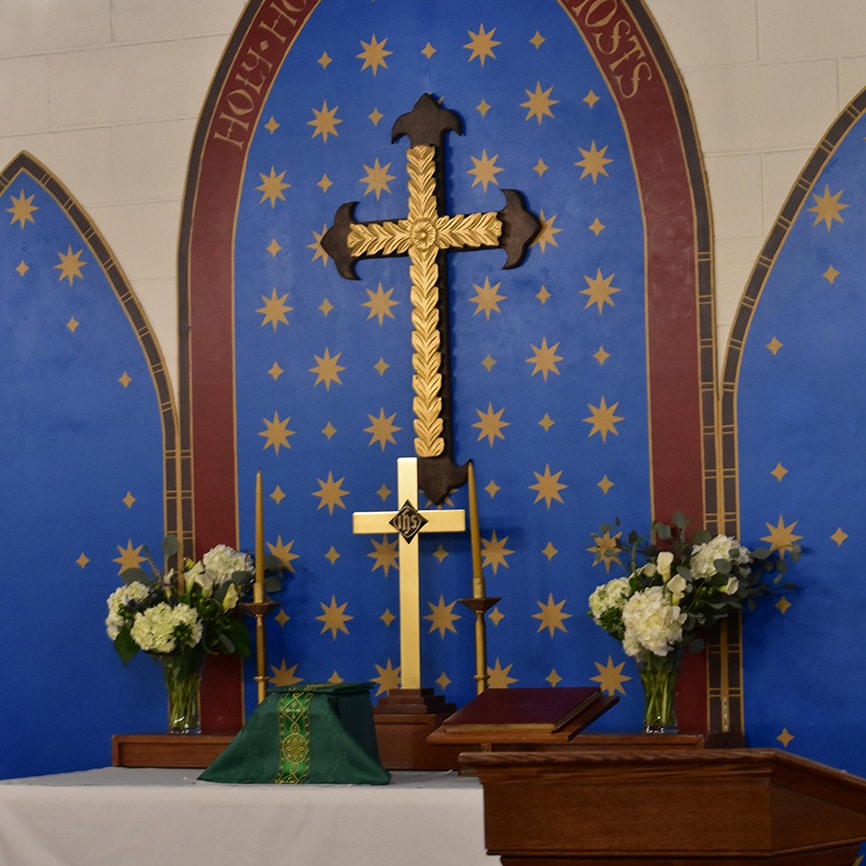The second Sunday after Easter, has for many centuries been called Good Shepherd Sunday. It received this name from the gospel lesson has been the passage appointed to be read this day since the time of St. Jerome. On this Sunday, during the Easter season, it is appointed for us to give special attention to the manner in which Christ’s provision for us is like a shepherd’s.
Last Sunday I had occasion to describe the scene of our Lord appearing and speaking to His disciples as like that of a shepherd coming upon a group of lost and frightened sheep. The peace which comes over the disciples in the presence of the risen Lord is a result of the care and gentle leadership which they have come to expect from Christ. They were no longer lost, for the good shepherd had returned to them.
We continue this Sunday along this theme, developing the concept of the good shepherd.
The contemplation of this theme in the midst of Eastertide, drives us to consider that Christ is the Good Shepherd because he was also the Good Sheep.
Isaiah likens Christ in His passion to a sheep led to the slaughter. “He was oppressed, and he was afflicted, yet he opened not his mouth; like a lamb that is led to the slaughter, and like a sheep that before its shearers is silent, so he opened not his mouth.” Our Lord when faced with slanderous accusations, blatant lies, blasphemy against His divinity and a rejection of justice and truth by those with authority, yet remains silent, such that both Caiphas and Pilate are forced to marvel.
The silence of the innocent in the face of unjust persecution is the theme upon which St. Peter elaborates in our epistle lesson. He explains that such persecution is to the credit of the Christian, precisely because it follows in the pattern of our Lord.
“For what credit is it if, when you are beaten for your faults, you take it patiently? But when you do good and suffer, if you take it patiently, this is commendable before God. For to this you were called, because Christ also suffered for us, leaving us an example, that you should follow His steps: “Who committed no sin, Nor was deceit found in His mouth”; who, when He was reviled, did not revile in return; when He suffered, He did not threaten, but committed Himself to Him who judges righteously;”
Jesus did not return evil for evil, he did not retaliate against his persecutors, and He had done nothing to merit the hatred and violence which was heaped upon Him. Followers of Christ are to embrace His example. They are to take up their crosses, as He did. We are to suffer patiently even when we are innocent in the same way.
This is worth giving particular attention. Peter does not extoll the patience of those who suffer just rebuke, though in truth this is hard enough. In the face of our own failures, avoiding rebuke and punishment can become our greatest ambition. Often, the lies which are the most tempting are lies that hide previous wrong-doing. But Peter treats it as a matter of course that we ought to be willing to suffer for our sins. We must be ready to receive the just consequence of our faults, for in truth, this is the loving discipline of God. To receive courageously and dutifully the punishment of our failings is for our benefit and growth in the Lord, though it is not worthy of any great respect, says St. Peter. And let us recall that Peter did know what it was like to suffer for his faults.
But the kind of suffering that is praise-worthy, is suffering which is undeserved. To be persecuted though you are in the right, to be harmed though innocent, this is praise-worthy. Now, certainly, it is very seldom that we suffer as entirely innocent victims. The pains we experience are virtually always intermingled with just deserts. But Peter’s point is that even when we are the most innocent, and least to blame, we have not gone beyond the suffering of our Lord. And the more innocent we are, the more righteous our standing, the like Christ is our suffering.
Here we see that Christ leads the sheep by himself becoming one of the sheep. He lived out the pattern which we are to follow. “For we do not have a High Priest who cannot sympathize with our weaknesses, but was in all points tempted as we are, yet without sin.” Our Lord experienced all the pain and sorrow that afflicts His children, yet without falling. Jesus is meek, long-suffering, courageous and generous, giving the perfect example what a sheep must be, and therefore we must follow Him.
Further, our Lord not only leads the sheep by example, he provides for the sheep, as a shepherd must, by becoming a sacrificial lamb. He fulfills the prophetic double meaning in Abraham’s words after he has been instructed to spare his son Isaac, “My son, God will provide himself a lamb” God provides the lamb, which is himself. In this way, Jesus feeds his sheep, as a shepherd is bound to do, with himself. In John chapter 6 Jesus explains that God fed the people of Israel in the wilderness with manna, but the greater and living bread was to be His own body: “If anyone eats of this bread, he will live forever. And the bread that I will give for the life of the world is my flesh.” Jesus is the good shepherd because he becomes the sacrificial lamb who feeds the people of God with his own flesh.
Further, Jesus protects His flock by becoming the lamb of God. In the book of Exodus, God shielded the Israelites from the angel of death and freed them from the Egyptians in the same night, the night of the Passover. He did this by instructing the people to sacrifice a lamb and spread its blood upon the doorposts of their homes. The blood of this lamb would protect them from death, and secure their freedom from slavery. Jesus is the true Passover lamb, as Paul says in first Corinthians, “For Christ, our Passover lamb, has been sacrificed.” Jesus protects His people from the angel of death and frees us from slavery to sin. For, even the people of God have deserved to be slain, just like the Egyptians, for the wage of sin is death. The angel of death comes for them as sinners. However, Jesus is the one whom John the Baptist identified, “Behold, the Lamb of God, who takes away the sin of the world!” The blood of Christ covers the Christian such that death no longer has any claim upon him. Death, the last enemy to be destroyed, is undone by the very death of the lamb of God.
Similarly, the slavery of sin is defeated by Christ’s ransom. As St. Peter writes, “you were ransomed from the futile ways inherited from your forefathers, not with perishable things such as silver or gold, but with the precious blood of Christ, like that of a lamb without blemish or spot.”
We are set free by the perfect sacrifice of Christ, and made able to resist the temptations of the world, the flesh and the devil. Jesus is the good shepherd because he dies for the sheep as the final and eternal Passover lamb. JESUS said “I am the good shepherd: the good shepherd giveth his life for the sheep.”
The great mystery of Christ as the good shepherd is this: The shepherd leads as a lamb, he provides as a lamb, and he protects as a lamb. This is the beauty of Word of God. How wonderful are the ways of God. This beautiful picture is summed up in Revelation 7, “For the Lamb in the midst of the throne will be their shepherd, and he will guide them to springs of living water, and God will wipe away every tear from their eyes.” The lamb who is our shepherd will guide us. Though we will suffer and struggle in these days, he has shown us the way, and provides for our nourishment and protection as we follow Him. Let us trust Him, and rely on Him until the promise of His grace and care is fully realized in Heaven.
May 4, 2025
Christ Church Anglican



